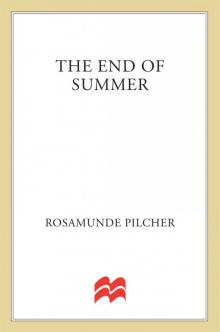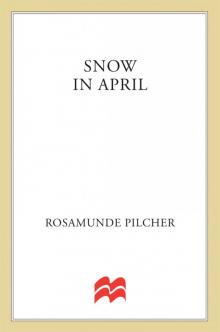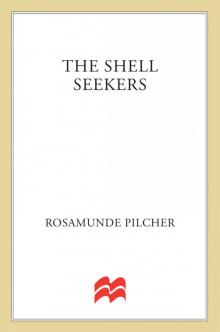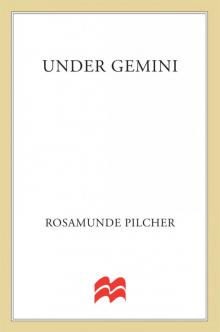- Home
- Rosamunde Pilcher
Flowers in the Rain & Other Stories Page 13
Flowers in the Rain & Other Stories Read online
Page 13
“I’ll put a notice in the post-office window,” Mrs. Midgeley had suggested, and together she and Abigail had drafted the wording of a little card. All that came of this, however, was a shifty-eyed boy on a motorcycle, who looked so untrustworthy that Abigail did not even let him into the kitchen. Too frightened to say that she didn’t like the look of him, she told a lie and said that she had already found somebody else. He had then turned quite unpleasant and given Abigail one or two pieces of his meagre mind before roaring away with an offensive blast of smelly exhaust-pipes.
“Why don’t you get in touch with a gardening contractor?” Yvonne had asked. Yvonne was Abigail’s friend, married to Maurice, who commuted daily to the City. Yvonne preferred horses to gardening. She spent her life ferrying her children and their ponies to and from gymkhanas and meets, and when she wasn’t doing this she was either mucking out, heaving hay bales, cleaning tack, grooming, plaiting manes, or ringing up the vet. “Maurice got fed up with these casual men who never come, so he made a deal with a contractor, and now a team comes once a week, and we never even pull up a weed.”
But Yvonne’s garden was simply a lawn, some beech hedges, and a few daffodils It never looked anything but starkly neat, and bore no relation at all to the beautiful garden which was one of the nicest things old Dr. Haliday had bequeathed to his daughter Abigail. She didn’t want it licked over once a week by a team of stout, heartless men. She wanted somebody who would not only work in the garden, but would love it as well.
“It would help,” said Mrs. Brewer, who came in two mornings a week to do for Abigail, “it would help if you had a cottage to offer. Easy to get help if you can offer a house with the job.”
“But I haven’t got a cottage. And there’s no room to build a cottage. And even if there was, I couldn’t afford it.”
“Makes a difference, having a little cottage,” Mrs. Brewer said again. She went on saying it, at intervals, all through the morning, but did nothing to help the situation.
* * *
For six weeks Abigail toiled on her own. The weather was fine and this made things worse, because it meant that she never stopped working out of doors until it was almost too dark to see. But despite this, she saw the slow rot already begin. Things became untidy. Chickweed and couch-grass crept in from the neighbouring wood. Dead leaves revealed themselves, skulking beneath the lavender hedge, blown into dismal heaps behind the sundial. The vegetable garden, dug by Mr. Jenkins, lay dark and sullen, waiting for the drills which she had no time to make, for the seeds which she had no time to sow.
“Perhaps,” she said to Mrs. Brewer, “I should forget about vegetables. Perhaps I should just sow it all out in grass.”
“That would be a crying shame,” said Mrs. Brewer sternly. “Took years to make, that asparagus bed. And think of those parsnips Mr. Jenkins used to bring in. Could make a meal of them, I used to say. That’s what I used to say. Could make a meal of them.”
A wind blew, and one of the gates swung open and broke its hinge. The clematis Montana needed to be pruned, but Abigail was frightened of ladders. She knew that she should order peat for the azaleas. She wondered if the motor mower had been serviced.
She met Yvonne in the village. Yvonne said, “Darling, you’re beginning to look exhausted. Don’t tell me you’re trying to cope with that garden on your own?”
“What else can I do?”
“Life is too short to kill yourself over a garden. You’ve just got to face facts. Your father and Mr. Jenkins were unique. Now, you’ll have to simplify things. You’ve got to have some sort of a life of your own.”
“Yes,” said Abigail, knowing that this was true. She walked home with her basket of groceries and tried to decide what she should do. She thought, I am forty, and this gave her a shock as it always did. What had happened to the dreams of youth? They were gone, slipped away with the years. Years spent working in London, and then coming back to Brookleigh to take care of her father after her mother died. To keep herself busy, she had taken a job in the local library, but six months ago, when the Doctor had had a minor stroke, she had given this up as well, and devoted all her time and energy to keeping an eye on the active and determined old man.
And now he was dead, and Abigail was forty. What did one do at forty? Did one stop wearing jeans, buying pretty clothes, feeling cheerful in the sunshine? Did one become a career woman, or did one simply vegetate, moving, without visible effort, from one day to another, until one was fifty, and then sixty. She thought, I don’t feel forty. It was nearly middle-aged, and sometimes Abigail felt as though she were still eighteen.
These baffling reflections lasted her all the way home. She came up the lane, and around the corner of the privet hedge, and saw the bicycle. It was a blue bicycle, very spindly and old, with the most uncomfortable-looking seat. An unfamiliar bicycle. Whose?
* * *
There was nobody in sight. But, as Abigail approached her back door, a figure came around the house from the front garden and said, “Good morning,” and so amazing was his appearance that for an instant Abigail could only stare. He had a great deal of hair and a large, shaggy brown beard. On top of the hair was a knitted hat with a red tassel. Below the beard came a sagging sweater, which reached almost to the man’s knees. Then stained corduroys and old-fashioned lace-up boots.
He came towards her. “That’s my bicycle.” She saw that he was quite young; his eyes, in all that mass of hair, a remarkable blue.
“Oh, yes,” said Abigail.
“I heard you were wanting a gardener.”
Abigail played for time. “Who told you?”
“The wife went to the post office, and the lady there told her.” They gazed at each other. He added simply, “I’m needing a job.”
“You’re new here, aren’t you?”
“Yes. We hail from Yorkshire.”
“How long have you been in Brookleigh?”
“About two months now. We’re living in the Quarry Cottage.”
“The Quarry Cottage…” Abigail’s voice was dismayed. “I thought that had been condemned.”
The man grinned. White teeth, very straight and shining, gleamed through the undergrowth of his beard. “It should have been. But at least it’s a roof over our heads.”
“What brought you to Brookleigh?”
“I’m an artist.” He went to lean, gracefully, against the kitchen window-sill, his hands in his pockets. “I’ve been teaching in a secondary school in Leeds for the past five years, but I decided that if I didn’t chuck it up and try to make something of my painting now, then I never would. I talked it over with Poppy—she’s my wife—and we decided to give it a try. And I came here because I wanted to be near London. But I’ve got a couple of kids and they have to be fed, so I need a part-time job.”
There was something very disarming about him, with his bright blue eyes and his extraordinary clothes and his composed manner. After a little, Abigail said, “Do you know anything about gardening?”
“Yes. I’m a good gardener. My father had a little plot when I was a boy. I used to garden with him.”
“There’s a lot to be done here.”
“I know,” he answered coolly. “I was having a look around. It’s time you got your vegetables in, and that climbing rose on the front of the house needs to be cut back…”
“I really meant that it’s quite a big garden. A lot of work.”
“But it’s beautiful. It would be a pity to let it go.”
“Yes,” said Abigail, and her heart warmed to him.
There was another small pause while they eyed each other. He asked, “Have I got the job?”
“How much time can you give me?”
“I could come three days a week.”
“Three days isn’t very much in a garden this size.”
He smiled again. “I have to keep time for my painting,” he insisted, politely but firmly. “And in three days I can do a right load of work.”
Abigail he
sitated only a moment longer. And then, impulsively, she made up her mind. “All right. It’s a deal. And you can start on Monday morning.”
“Eight o’clock, I’ll be here.” He picked up his bicycle and swung a leg over that dreadful saddle.
“I don’t know your name,” said Abigail.
“It’s Tammy,” he told her. “Tammy Hoadey.” And with that he was away, pedalling down the drive, with the tassel on his hat blown backwards in the breeze.
* * *
The village, when they heard the news, were much concerned. Tammy Hoadey was not a local man. He came from “up north,” nobody knew anything about him. He had set up house in the derelict cottage by the old quarry. His wife looked like a gypsy. Was Abigail sure of what she was doing?
Abigail assured the village that she was quite sure.
Mrs. Brewer was more horrified than most. “Not a bit like old Mr. Jenkins. Gives me quite a turn seeing him working away with that beard. And the other day, he ate his lunch by the sundial. Sitting in the sun, he was, cool as a cucumber, just eating his sandwich.”
Abigail had already noticed this breach of etiquette but had not remarked upon it. After all, just because old Mr. Jenkins had incarcerated himself each day in the dank tool-shed, to sit on an upturned bucket, eat his lunch and read the racing page of the daily paper, there was no reason why Tammy should be expected to do the same. And if a man worked in a garden, why should he not enjoy it as well? She said as much, in her usual diffident manner, to Mrs. Brewer, who sniffed and was silenced, but continued to disapprove of Tammy.
For two months all went well. The gate was mended, the lily-pool cleaned, the vegetable garden planted. The grass began to grow, and Tammy rode up and down the sloping lawn on the motor mower. He barrowed manure, tied up the clematis, weeded the borders, shifted a straggling rhododendron. And all the time, as he worked, he whistled. Whole arias and cantatas complete with trills and arpeggios. Strains of Mozart and Vivaldi pierced the air, mingling with bird-song. It was like having one’s own private flautist.
And then, in the middle of July, he came to Abigail and told her that he was going to be off for two months. She was both hurt and angry. “But, Tammy, you can’t leave me without warning. There’s the grass, and the fruit to pick, and everything.”
“You’ll manage,” he told her calmly.
“But why are you going?”
“I’m going to work at the potatoes for a contractor. It’s good money. I want to get all my pictures framed, and that costs a bomb. If they’re framed I can try to get them into some exhibition. Unless I exhibit, I’m never going to sell anything.”
“Have you ever exhibited?”
“Yes, once, in Leeds. A couple of pictures.” He added, with no false modesty, “They both sold.”
“I still think it’s very unfair of you to walk out on me.”
“I’ll be back,” he told her. “In September.”
* * *
There was obviously nothing to be done. Tammy duly went, leaving Abigail with no hope of finding, in midsummer, a replacement. No hope, even, of hiring some odd-job man to see her over the crisis. Besides, after her fury had died down and she was able to view the situation in comparative calm, she realized that she did not want another gardener. No man worked harder than Tammy Hoadey, but what was most important was that Abigail liked him. It was a bore, but the two months would pass. She would wait for him to return.
Which he did. Unchanged, still wearing the same bizarre clothes, thinner, perhaps, but as cheerful as ever. Whistling, he began to sweep up the first of the leaves. Now, it was the Rodrigo Guitar Concerto. Abigail, in jeans and a scarlet sweater, went out to help him. They built a fire and pale smoke rose, a grey plume, up into the still, early-autumn air. Tammy stepped back from the bonfire and leaned on his broom. Across the fire and the smoke their eyes met. He smiled at Abigail. He said, “You look really nice in red. Never seen you wear red before.”
She was embarrassed, but gratified as well. It was years since she had been paid such a warm and spontaneous compliment.
“It … it’s only an old jersey.”
“It’s a good colour.”
The compliment stayed with her, warming her, all through the next day. That morning, she walked to the village to do her shopping. Next door to the chemist was a small boutique, recently opened. In the window was a dress. A silk dress, very simple, neatly belted, the skirt a fan of deep pleats. The dress was red. Without allowing herself a second thought, Abigail walked into the shop, tried on the dress and bought it.
She did not tell Yvonne the reason she had been so impulsive. “Red?” said Yvonne. “But, darling, you never wear red.”
Abigail bit her lip. “You don’t think it’s too bright? Too young?”
“No, of course I don’t. I’m just astonished at your doing something so out of character. But I’m pleased, too. You can’t go on mouldering around in dun-coloured clothes forever. Anyway, I had a great-aunt who lived to be eighty-four, and she always went to funerals in a sapphire-blue hat with feathers.”
“What’s that got to do with my red dress?”
“Nothing, I suppose.” They began to laugh together, like schoolgirls. “I’m glad you bought it. I’ll have to throw a party, so that you can wear it.”
* * *
But, in October, the cheerful whistling suddenly stopped. Tammy came to work silent and uncommunicative. Abigail, terrified that he was going to hand in his notice, gathered up her courage and asked him if anything was the matter. He said yes, everything. Poppy had left him. She had taken the children and gone to her mother in Leeds.
Abigail was devastated. She sat on the edge of the cucumber frame and said, “For good?”
“No, not for good. Just for a visit, she says. But we had a row. She’s so fed up with Quarry Cottage, and I can’t really blame her. She’s scared the kids’ll fall down the quarry bank, and the little one’s been coughing at nights. She says it’s the damp.”
“What are you going to do?”
He said, “I can’t go back to Leeds. I can’t go back to living in a city. Not after all this.” A tired gesture somehow involved the garden, the wood, the flaming borders, the golden oak leaves.
“But she’s your wife. And your children…”
“She’ll come back,” said Tammy, but he did not sound convinced. Abigail ached with sympathy for him. At lunchtime, when he settled down to his meagre snack, she filled a bowl with soup and carried it out to where he slumped, despondent, by the greenhouse.
“If your wife isn’t here to take care of you, then I must,” she told him, and he smiled gratefully, and took the soup.
Unbelievably, Poppy and the children returned, but the tuneful whistling was not resumed. Abigail felt herself caught up in some television soap opera: “The Continuing Saga of Tammy Hoadey.” She told herself the problems were between Tammy and Poppy, husband and wife. It was no concern of Abigail’s. She would not interfere.
But remaining a bystander was not to be possible. A week or so later, Tammy sought her out and said that he wanted to ask a favour of her. The favour was that Abigail should buy one of Tammy’s pictures.
She said, “But I’ve never seen any of your pictures.”
“I brought one with me. On the back of the bike. It’s framed.” She stared at him, trapped in embarrassment, and he went off and returned with a large parcel wrapped in crumpled brown paper and tied up with binder twine. He undid the knots and held the picture out for Abigail to inspect.
She saw the silvered frame, the bright colours, the upside-down procession of odd little people, and felt total incomprehension of this new form of art. It was so out of her league, so foreign to any of Dr. Haliday’s pictures, that she could think of nothing to say. She started to blush. Tammy stayed silent. At last Abigail blurted out, “How much do you want for it?”
“A hundred and fifty pounds.”
“A hundred and fifty? Tammy, I haven’t got a hundred and fifty
pounds to spend on a picture.”
“Have you got fifty?”
“Well … yes…” Cornered, she was driven to cruel truth. “But … well, it’s just not my sort of picture. I mean, I would never buy a picture like that.”
He was undeflected by this. “Well, would you lend me fifty pounds? Just for a bit? You can have the picture as surety.”
“But I thought you’d earned so much on the potatoes?”
“It all went in framing. And it’s my little boy’s birthday next week, and we owe the grocer. Poppy’s come to the end of her rope. She says if I don’t start selling pictures and making money, she’s going back to her mother for good.” He sounded desperate. “Like I said, I don’t blame her. It’s a hard deal for her.”
Abigail looked again at the picture. The colours, at least, were bright. She took it from Tammy. She said, “I’ll keep it for you. I’ll keep it safely.” And she went indoors and up to her bedroom and found her bag, and took from it five crisp ten-pound notes.
“This,” she told herself, “is probably the stupidest thing I’ve ever done in my life.” But she closed her handbag and went downstairs and gave the money to Tammy.
He said, “I can never thank you enough.”
“I trust you,” Abigail told him. “I know you won’t let me down.”
* * *
At lunchtime that day Yvonne called. “Darling, it’s dreadfully short notice, but would you come and have dinner with us tonight? Maurice has just phoned from the office, and he’s bringing a business friend back for the night, and I thought it would be nice if you’d come and help me entertain him.”
Abigail did not really want to go. She felt depressed by Tammy’s problems, and not in the mood for a party. She began to make unenthusiastic noises, but Yvonne thought she was being stupid, and told her so. “You’re getting terribly old-maidish. What’s happened to all that impulsive spirit? Of course you’re coming. It’ll do you good and you can wear your new red dress.”

 Wild Mountain Thyme
Wild Mountain Thyme Sleeping Tiger
Sleeping Tiger Flowers in the Rain & Other Stories
Flowers in the Rain & Other Stories September
September The Blue Bedroom: & Other Stories
The Blue Bedroom: & Other Stories The Carousel
The Carousel The End of Summer
The End of Summer Snow in April
Snow in April The Shell Seekers
The Shell Seekers Under Gemini
Under Gemini The Empty House
The Empty House The Day of the Storm
The Day of the Storm Another View
Another View Voices in the Summer
Voices in the Summer The World of Rosamunde Pilcher
The World of Rosamunde Pilcher Voices In Summer
Voices In Summer Blue Bedroom and Other Stories
Blue Bedroom and Other Stories